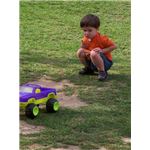Play is essential to a child’s overall healthy development and supports children’s skills: social/emotional, physical, cognitive, language, literacy and self regulation. Ginsburg, 2007; Packer Isenberg & Quisenberry, 2002
The stages of play in early childhood
From Mildred Parten, 1932, an American sociologist, and researcher at the University of Minnesota's Institute of Child Development, whose play categories are still actively used by educators today. They include: solitary play; onlooker; parallel group activity; associative group play; and cooperative group play.
1. Solitary play, starts in infancy. In this stage, children explore their environment, constantly discovering new things and completely absorbed in what they are doing and not paying attention to others. Solitary play continues into the toddler years.
2. Onlooker play is when the child watches others at play but does not engage in it. The child may talk about the play, without actually joining in.
3. Parallel play is where children are playing beside others them rather than with others. They will be in the same area with other children, they will play with similar toys, but they do not play with each other. They may sometimes copy other's play but seldom, if at all, interact with others.
4. Associative play, occurs in small groups playing together. Children will begin to interact through talking and taking turns with toys, but each child acts alone.
5. Cooperative play, begins emerging in four and five year olds when children play cooperatively with others. Their play has a structure and children will communicate with each other as they work together. As their social and emotional development matures children learn respect for others property and are more willing to share. Their communication skills are more developed so they can share ideas and tell each other what to do.
Children move through the stages of play at their own pace.
RESOURCES:
Santrock, J. W. (2007). Parten's classic study of play. In A topical approach to life-span development.
Parten's stages of play, Wikipedia.

Solitary play